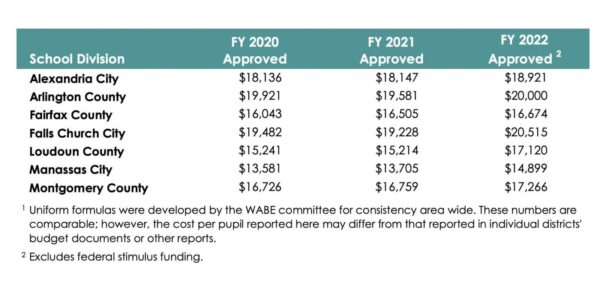
(Updated at 11:55 a.m.) The first Arlington School Board candidate has stepped up — and he is a current teacher in Arlington Public Schools.
Gunston Middle School world geography teacher Brandon Clark says he is running to provide a point of view he says is missing on the School Board. Most of the five members are current and former parents, while some have past experience as educators.
“What we don’t have is someone who is a current APS employee,” he tells ARLnow. “We don’t have someone who understands how these decisions impact our students, families and community.”
He will vie for the seat that opens up when School Board Chair Barbara Kanninen steps down in December. So far, he is the only candidate on the ballot for the November general election. If elected, he would resign as a teacher.
Clark has been an APS teacher for five years. He and his wife both teach at Gunston, where she is a math coach. They have young twins who will one day go to APS, says Clark, a graduate of Wakefield High School.
Since joining the school system, he has taken on leadership positions at Gunston and on the Teachers’ Council on Instruction, which advises the superintendent. In these roles he says he saw systemic problems in how APS communicates and allocates resources.
“I’m running because I believe we have to do better — and do better now,” he said. “We can’t wait until we have to do damage control. We have serious systemic issues that need to be fixed and we need strategic ways to deploy our resources to fix them.”
Clark had mulled running for three years, but a communications mishap two months ago tipped the scales for him.
In January, APS notified him some of his students had tested positive for Covid. He received two communications from APS, each telling him to quarantine for two different lengths of time.
“The more I communicated with people, the more I learned it was happening all over APS,” he said. “I figured they had it all figured out, but they didn’t. I realized how bad things were. It was a symptom of a greater systemic problem — a mismanagement of policies, communications and resources.”
If elected, he said, Clark intends to direct Superintendent Francisco Durán to review how APS sends information to staff and families and find more efficient, centralized alternatives.
To the extent that is legally possible, he said, people “should be able to see what was sent to teachers and parents on a single landing page that is convenient and easy to access. There are too many avenues of communication. When you get that, you breed confusion.”
The number of siloed committees for parents and teachers makes it harder to be heard by APS administrators, he asserted.
“Parents and teachers need to realize they have power together and they can actualize that by meeting,” he said. “If you really want feedback, you have to streamline all these committees — parents and teachers should be in the same room.”
Beyond communications, APS can be more strategic is in its budget, selecting just one or two priorities per year and showing how every expenditure aligns with them, Clark said.
“Instead of strategically targeting valued dollars to school-based initiatives, I think we’ve squandered money on goods and services we don’t need and central office expenses,” he said. “We spend $20,000 per student. Where is that money going?”

He credited Durán with tackling years of mismanaged budgets and prioritizing teachers with the forthcoming 2022-23 budget. While the budget commits to compensating teachers for skipped pay raises, he said APS is playing catch-up and should be cutting superfluous expenses to focus on teachers and school building-level expenses.
Clark, a Democrat, says he will participate in the School Board caucus process, but doing so without much political capital as a teacher makes him uneasy.
“It feels frustrating as someone for whom — as a teacher in a family of teachers — running for office is a great sacrifice,” he said. “I went out on weekends and nights, when the babies were down, and gathered signatures on my own. I would like to see that work understood in the caucus system.”

